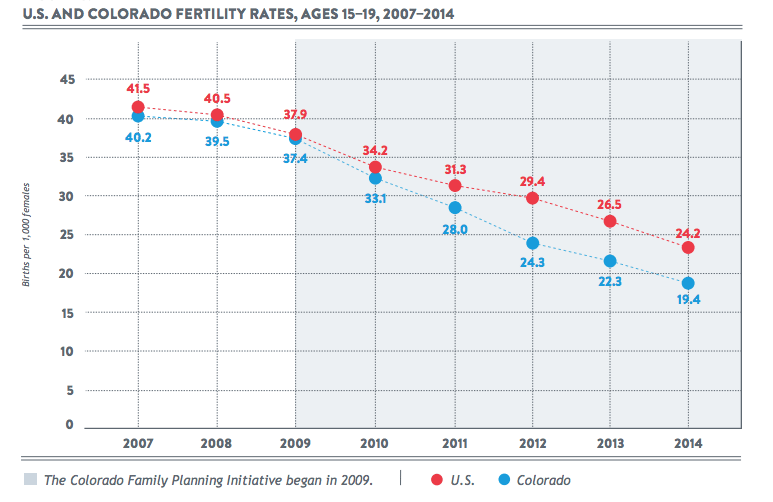Colorado has passed a milestone in its effort to reduce teen pregnancy: The birth rate for women ages 15 to 19 has fallen by more than half since 2009. The rate of teen abortion has fallen even faster.
This is a nationwide phenomenon, but it has happened faster here -- most likely because Colorado was a pioneer in providing long-acting contraception for low or no cost.
"This is just a tremendous Colorado success story," said Erin Miller, vice president of health initiatives for the Colorado Children's Campaign.
Now, though, state officials are anxiously waiting to see if President Donald Trump's administration may make changes to a crucial funding source -- and there's a deadline looming.
"We’ve been given zero information from the federal government about what to expect," said Jody Camp, director of family planning programs for the state of Colorado. Still, she's confident that the state will be able to continue its contraception efforts.
What Colorado did:
The state of Colorado has had a family planning program for nearly 50 years that has long worked with clinics to provide a wide range of contraception.
"For 47 years, our family planning clinics have always supported a broad range of FDA-approved contraceptive methods like pills, patches, rings, condoms -- natural family planning, if that’s what the client was interested in," Camp said.
And the state for years has paid for long-acting reversible contraceptives (LARCs) such as IUDs and implants, some of which can prevent pregnancies for up to 10 years after insertion. People who use long-acting contraceptives don't have to make regular doctor visits just for birth control, don't have to remember to take a pill and don't have to remember to use them in the moment. And they're highly effective.
But that option was limited until very recently. Many of the state's low-income clinics simply didn't have the expertise or capability to insert the devices, and their high cost -- up to $1,300 to get an IUD -- put them out of reach for many.
That changed in 2008, when an anonymous donor (reportedly the Susan Thompson Buffett Foundation) gave Colorado a gift that would work out to about $28 million.
"The anonymous donor dollars allowed us to stock the shelves, train the providers, get those best practices out there, do a little marketing to let clients know they were there," Camp said.
Suddenly, long-acting contraceptives weren't just available in theory.
The results were dramatic.
In fiscal year 2009, the state's low-income "Title X" clinics reported they had provided LARCs to about 2,000 patients. That number had tripled within three years.
Today, the state released new data on the program. It reports that:
- The birth rate for young women ages 15 to 19 fell by 54 percent, to 17.1 per 1,000 people, from 2009 to 2016.
- The clinics provided about 44,000 free or low-cost long-term contraceptives in that period.
- The abortion rate for women ages 15 to 19 fell by 64 percent.
- A University of Colorado study estimated that social services avoided spending $70 million because fewer children needed them.
The effects were especially pronounced in rural Colorado. In 2009, 17 counties reported more than 50 births per 1,000 late-teen women. In 2014, it was only two counties.

The rest of the country followed Colorado.
The Affordable Care Act requires that most employer and health exchange insurance plans include free contraceptives, including the long-acting types. The law also allowed Colorado to expand Medicaid -- meaning about 200,000 more women got access to contraception and other benefits.
And because the state had been working for years on the contraception question, the clinics were ready to provide them to all those new Medicaid recipients.
That was important, because the donor money was never meant to last forever. In fact, it expired in 2015. In the meantime, the state had taught the clinics to start acting more like businesses. So when the money ran out, they knew how to bill Medicaid, and they could keep providing contraception.
"The Affordable Care Act really worked for our family planning clinics," Camp said.
The state legislature also stepped up its funding. While religious objections derailed an early effort, legislators agreed last year to increase family planning funding by $2.5 million.
"We had everyone from pediatric groups, public health folks to reproductive justice organizations … all of these different voices talking about evidence-based services," said Miller, of the children's campaign.
What about the feds?
The Trump administration has already had a significant effect on birth-control efforts in Colorado and nationwide. For one thing, it made it easier for employers to stop covering birth control.
The administration also ended grants through the Teen Pregnancy Prevention Program, which had been providing $750,000 per year to the local nonprofit Colorado Youth Matter. The organization closed in September.
Now, the administration has signaled it may change Title X, a program that sends about $3.6 million to Colorado's family planning initiative.
That money is usually given out in three-year "cycles." In other words, you only have to apply for it once every three years. The new administration has reduced that to a one-year cycle and told the states they'll have to reapply in January.
"We are waiting for the new funding opportunity announcement. We were told we were going to get it in September, we didn’t. October, we didn’t. November, we didn’t," Camp said. "Now we understand the application due date will be Jan. 3 -- and yet we’ve received no notice."
Miller, of Children's Campaign, said there is a "definite point of concern" about the federal money.
"There’s concern that it could be cut, concern that there could be limitations put on it," she said, citing the possibility that Trump's administration could try to limit access to emergency contraceptives like Plan B.
Still, Camp was optimistic that Colorado's gains in contraception availability would survive a funding cut.
"There are other states that don’t have state contributions, that don’t have expanded Medicaid, and they don’t have a supportive legislature. Colorado is the opposite," she said.
"If the Title X dollars go away ... yes, we’re going to have to scale back services, we’re going to have scale back hours or days that we’re open - but we’ll be able to keep our doors open, we’ll be able to provide LARC, and we’ll be able to support our family planning services."
But, she added, "if you tell me ACA is going to get scaled back, I’m going to have a different answer for you."











